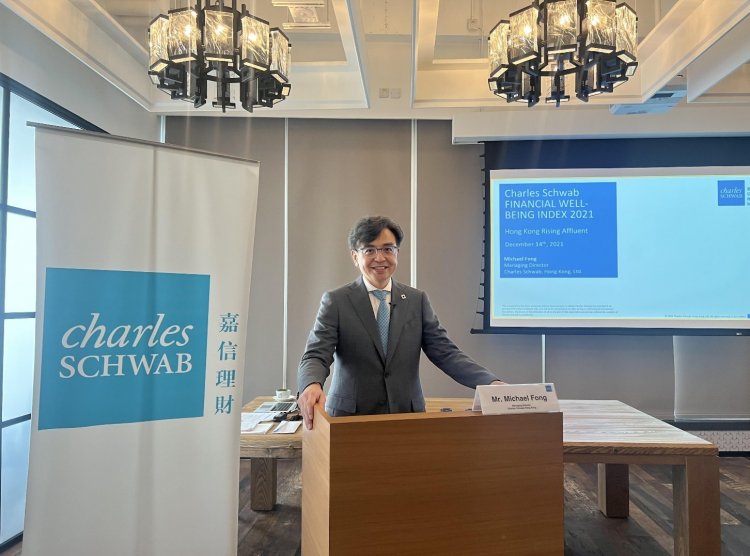Charles Schwab, Hong Kong, Ltd. today announced the findings of its “Hong Kong Rising Affluent Financial Well-being Index 2021”. As global economic growth returned in 2021, this year’s survey reported the highest confidence sub-index score in three years, suggesting Hong Kong’s rising affluent feel better prepared and more optimistic about their financial growth prospects. The findings suggest a greater tolerance for risk since last year as Hong Kong’s rising affluent report increasing their investments across a variety of products.
The Hong Kong Rising Affluent Financial Well-being Index is an annual survey that explores shifting perceptions and investment behaviours among those aged between 18 and 65 with a monthly income of HK$20,000 to HK$80,000. From September 17 to October 7, 2021, the survey interviewed 1,020 respondents. The overall financial well-being score at 59.13 out of 100, a 3.85-point increase from last year’s results. Calculated by Structural Equation Model (SEM), 19 indicators were designed to formulate the financial well-being index which consists of four sub-indexes, including:
- The confidence sub-index (57.16, +5.01) studies investors’ satisfaction towards their personal financial status and their level of confidence towards their personal financial growth prospects
- The planning sub-index (26.45, -0.52) reveals whether investors have and regularly review their financial plan, setting timelines for financial goals, and have a sense of possibility on achieving financial goals
- The management sub-index (73.10, -1.23) demonstrates investors’ sense of risk, attitude towards portfolio management, and sensitivity towards fees
- The engagement sub-index (63.65, +4.21) determines investors’ usage of financial services, trust towards professional financial advisers and digital financial advisory platforms
Investor confidence is returning among Hong Kong’s rising affluent
The survey shows a significant increase in Hong Kong Rising Affluent’s financial confidence. Compared to last year, they feel more satisfied with their personal financial status (+5.4% vs. 2020) and believe they have better financial growth prospects (+2.5% vs. 2020). A stable household income continues to be the number one confidence source (49.5%) while the rising affluents’ confidence in wealth management skills (45.4%) also give them assurance. Few respondents (-12.7% vs. 2020) claim that COVID-19 affects their confidence in personal finances, and there is a 12.2% decrease in the number of respondents who state COVID-19 as a primary concern.
More rising affluent are shifting their risk appetite from steady (-7.1%) to progressive (+2.7%) and aggressive (+4.1%). Since COVID-19 began, 11% of respondents, as compared to 8% in 2020, say they have increased their monthly investment amount. Products such as funds, real estate, bonds and ETFs saw an investment increase. However, fewer respondents (-6% vs. 2020) regularly review their financial plan or check ROI (-8% vs. 2020).
Michael Fong, Managing Director, Charles Schwab Hong Kong, said, “We are very glad to see an increasing optimism among Hong Kong’s rising affluent and many seem to start seeing the light at the end of the tunnel. However, we can’t stress enough the importance for investors to review their financial plans regularly in order to make sure their portfolios are appropriately diversified. This is critical especially when we are seeing people shifting to more aggressive investing. Being able to rebalance their portfolio regularly will help investors mitigate risk and market volatility.”
Increased trust in formal planning and financial advisors
Hong Kong Rising Affluent’s trust in financial advisors, institutions, platforms and tools is rising. There is a 5% increase in respondents who said they “trust highly in financial advisors/institution”, and a 4.9% increase in those who said they “trust highly in financial platforms/tools”. The surge in trust leads to the highest engagement sub-index score since 2019. Meanwhile, more rising affluent (+8.8%) now have a formal written financial plan and increasingly seek help from financial advisors (+18.4%). Those who rely on themselves to develop a formal plan drop 19.5%. Rising affluent with a formal written plan, overseas investment, and financial advisor usage are more likely to be satisfied with their plan.
Around 32.5% of respondents have increased the proportion of long-term investment, mainly because they value a consistent return rate and want to avoid being an active trader. About half of Hong Kong Rising Affluent with overseas investment have increased long-term investment compared to last year. On the other hand, 18% of respondents increased short-term investment.
“Many rising affluent may not fully agree with the importance of a financial plan as they think external events will eventually outpace their plans,” said Fong. “But the pandemic and the impact that it had on the economy taught us a lesson about the importance of financial preparedness. At Schwab, we believe it is particularly important to create a plan to help ensure your finances are on track. The good news is investment advice and financial planning have never been more accessible.”











![[infographic]-digital-experience-–-the-differentiator-for-any-online-business](https://dev.marketinginasia.com/kitech/wp-content/uploads/2022/06/24849-infographic-digital-experience-the-differentiator-for-any-online-business-150x150.png)




